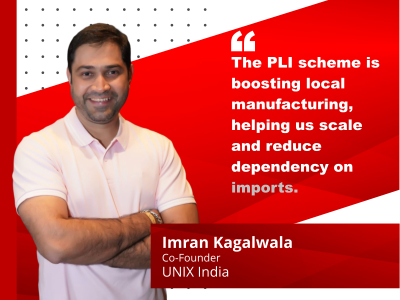Published on: Saturday, 02 November 2024 ● 4 Min Read
 The mobile accessories industry in India is facing a range of challenges, from intense market competition to counterfeit products undermining quality and trust. In an exclusive interview, Mr. Imran Kagalwala, Co-Founder of UNIX India, sheds light on the hurdles of scaling manufacturing operations locally. He highlights the role of the "Made in India" initiative, government policies like the PLI scheme, and how manufacturers like UNIX are adapting to stay competitive in this evolving market. This conversation also explores how e-commerce platforms are reshaping the distribution of mobile accessories in India.
The mobile accessories industry in India is facing a range of challenges, from intense market competition to counterfeit products undermining quality and trust. In an exclusive interview, Mr. Imran Kagalwala, Co-Founder of UNIX India, sheds light on the hurdles of scaling manufacturing operations locally. He highlights the role of the "Made in India" initiative, government policies like the PLI scheme, and how manufacturers like UNIX are adapting to stay competitive in this evolving market. This conversation also explores how e-commerce platforms are reshaping the distribution of mobile accessories in India.
What are the key challenges facing the mobile accessories industry in India today?
Market saturation due to the influx of numerous local and international brands has created intense competition, with companies struggling to differentiate themselves and maintain healthy profit margins. Counterfeit products pose another major hurdle, as the market is flooded with low-cost knock-offs that compromise quality and erode customer trust in genuine brands. Furthermore, price sensitivity among Indian consumers limits the adoption of premium products, making it difficult for brands focused on quality to achieve their desired market share and profitability. Additionally, the industry faces the ongoing challenge of keeping up with fast-evolving technology and design trends, which demand continuous innovation and investment. Finally, supply chain disruptions, especially in sourcing components, add to operational challenges, potentially impacting product availability and pricing. Together, these challenges require strategic adaptability and a strong focus on customer loyalty to succeed in this competitive market.
How do you see the "Made in India" initiative influencing the overall manufacturing sector?
The "Made in India" initiative has been transformative for the country’s manufacturing sector, currently contributing around 18% of India’s GDP and aiming to reach 25% by 2025. By strengthening domestic production and reducing import dependency, this initiative has stimulated job creation, with projections indicating nearly 100 million new manufacturing jobs by 2030. Foreign direct investment has also surged, with inflows surpassing $85 billion in 2023, further accelerating the sector's growth. Additionally, "Made in India" is advancing skill development and innovation, allowing Indian manufacturers to meet global quality standards and boosting the country's international competitiveness.
What trends are you noticing in consumer behaviour regarding technology and accessories?
Consumer behaviour in tech and accessories is increasingly driven by personalization, sustainability, and quality. Shoppers now seek products that reflect their lifestyle, favouring unique designs and eco-friendly materials. Quality and durability are also priorities, with consumers willing to invest in long-lasting products. Compatibility with existing devices is key, as consumers prefer connected ecosystems. For instance, our UNIX Mini Capsule Power Bank is a bestseller that exemplifies these trends. It offers fast charging for multiple devices and includes an LED flashlight, making it a versatile on-the-go accessory.
What role do you believe government policies play in shaping the technology sector?
Government policies are pivotal in shaping the technology sector by fostering a supportive business environment, easing compliance, and incentivizing local manufacturing. Simplified regulations, fair taxation, and support for domestic raw material production are key to building a self-reliant supply chain. Public-private partnerships (PPPs) are instrumental in advancing infrastructure and driving innovation. Upskilling programs, especially for MSMEs, enhance global competitiveness and industry resilience. By creating a holistic ecosystem with targeted support, these policies can accelerate India’s growth as a leading global technology player.
How do you envision the relationship between manufacturers and e-commerce platforms evolving?
I see the relationship between manufacturers and e-commerce platforms evolving into a more collaborative and dynamic partnership. With around 250 million online shoppers in India last year, the shift to online shopping is undeniable, and manufacturers are increasingly leveraging these channels to connect directly with consumers. The rise of quick commerce further emphasizes the need for convenience, prompting us to explore rapid-delivery options to meet consumer expectations. For UNIX, through our website, and partnership with Amazon, and Flipkart allows us to reach broader audiences while delivering quick, reliable shopping experiences that align with today’s convenience-driven preferences.
In what ways is the PLI scheme impacting local manufacturing capabilities?
The Production-Linked Incentive (PLI) scheme is significantly boosting local manufacturing capabilities by offering financial incentives tied to production output, encouraging manufacturers to scale operations and invest in advanced technology. This scheme reduces dependency on imports by fostering a robust ecosystem for raw materials and components, especially in sectors like electronics and mobile accessories. Additionally, it has attracted both domestic and international players to establish manufacturing facilities in India, creating jobs and building a skilled workforce. Over time, the PLI scheme is accelerating India’s journey toward becoming a self-reliant manufacturing hub, enhancing competitiveness in the global market.
No comments posted
© 2019 KIVAA Group | All right reserved. www.theindustrial.in
Leave a reply: